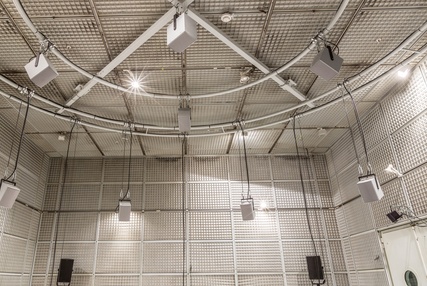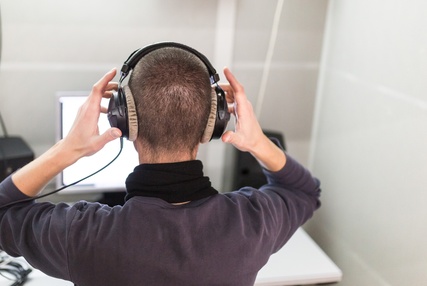mar 31 mars 2026,
mar 7 avril 2026,
mer 8 avril 2026,
lun 20 avril 2026,
mar 21 avril 2026,
lun 27 avril 2026,
mar 28 avril 2026,
14h00- 17h00
Anglais
Perfectionnement
Tarif plein
:
1100 €
Mbre Forum Premium
:
770 €
Étudiant.e
:
550 €
Max est un logiciel de programmation graphique qui permet de traiter, de générer, et d'interagir avec des données MIDI, des flux audio, vidéo, ou tout autre type de données, comme celles provenant de capteurs.
![]()
Objectifs pédagogiques
À l'issue de la formation, les stagiaires auront acquis les connaissances en techniques de programmation avancée dans Max. Ils et elles seront capables de réaliser des patchs complexes et de choisir les outils software et hardware adaptés à leur projet utilisant Max.
Public concerné
Toute personne créative ayant un socle de connaissances de base sur Max et souhaitant monter un projet où Max peut s'avérer nécessaire : compositeurs, compositrices, développeurs, développeuses, interprètes, technicien et techniciennes du son, chorégraphes, créateurs et créatrices sonores, vidéastes, live-codeurs, live-codeuses, enseignants et enseignantes en musique ou en arts plastiques, makers...
Prérequis
- Maîtrise de l’anglais à l’écrit et à l’oral.
- Avoir suivi le stage Max Initiation ou pouvoir justifier d'un socle de connaissances et de compétences suffisantes sur Max et son environnement (maîtrise des traitements audio dans Max, des traitements de données, avoir réalisé les tutoriels Max "Basics"et "Data" ainsi que MSP "Basics" et "Synthesis" présents dans le logiciel).
- Avoir une pratique régulière du logiciel Max.
- Bonne connaissance d'un DAW (Digital Audio Workstation) tel que Pro Tools, Logic Pro ou autre et d'un logiciel d’édition audio (WaveLab, SoundStudio, Adobe Audition...).
- Bonne connaissance de la théorie du traitement du signal audio.
- Être à l'aise avec la plateforme de visioconférence Zoom.
Durée de la formation et modalités d’organisation
24h, 8 demi-journées de 14h-17h : lundi 30, mardi 31 mars et mardi 7, mercredi 8, lundi 20, mardi 21, lundi 27 et mardi 28 avril 2026
En anglais, en ligne
8 stagiaires maximum
Programme de la formation
Certains détails du programme de la formation peuvent être modifiés en fonction des évolutions des logiciels.
Lundi 30 mars
Utilisation approfondie des types de données pour la collecte de paramètres et de trajectoires : <coll>, <zl>, <expr>, <vexpr>, <nodes>, <table>
Synthèse additive, modulation en anneau et suivi d’amplitude
Mardi 31 mars
Comprendre la polyphonie et sa généralisation poly-procédurale : utilisation de <poly~> et ses abstractions par son intégration aux modules de synthèse et de traitements réalisés
Mardi 7 avril
Générer et utiliser des tables d’ondes dans des mémoires tampons (<buffer~>)
Approfondir et appliquer la réalisation d’un échantillonneur polyphonique et de traitements à multi-instance
Mercredi 8 avril
Développement bas niveau dans Max : découverte de la librairie <gen~> et de ses propriétés de développement : traitement, synthèse et synthèse par modèle physique
Lundi 20 avril
Développement de traitements dans le domaine fréquentiel grâce à la transformé de Fourier discrète à court terme (STFT) : utilisation de <pfft~>, de ses abstractions et objets spécifiques
Mardi 21 avril
Approfondir les traitements dans le domaine fréquentiel grâce à la transformée de Fourier discrète à court terme (STFT) : créer des effets de traitement par <pfft~>
Lundi 27 avril
Mettre en œuvre une architecture comme base de développement généralisé : gérer entrées, sorties, mixage (« dry/wet »), panoramique stéréo et quadriphonique
Gérer les flux audio par matriçage (<matrix~>, <matrixctrl>)
Mardi 28 avril
Déployer une architecture multicanal : introduire des objets <mc~>
Contrôler un patch de performance par divers systèmes de partition électronique : comparer la gestion de données entre boîtes de messages et base de données indexées
Moyens pédagogiques et techniques
Cette formation professionnelle se tiendra en ligne.
Besoins techniques
Il est demandé de télécharger Max en amont de la formation. Les logiciels ne sont pas inclus dans le tarif de la formation et non fournis à l’issue de la formation.
Pour suivre la formation dans les meilleures conditions, il est nécessaire d’utiliser deux écrans et avoir une bonne connexion au réseau internet.
Format de la formation
La formation est dispensée en anglais. Elle alterne entre des exposés théoriques, l'étude d'exemples à analyser et des travaux pratiques.
Supports pédagogiques
Présentations, support de cours sera remis audébut de la formation et des fichiers complémentaires seront fournis au fur et à mesure.
Les logiciels ne sont pas inclus dans le tarif de la formation et ne seront pas fournis à l’issue de la formation.
Suivi
- Session technique le premier jour de la formation pour vérifier l’installation des stagiaires.
- Contrôle du suivi par la signature d’une feuille de présence pour chaque demi-journée.
- Remise d’un certificat de réalisation, qui intègre les résultats de l’évaluation.
.Évaluation
- Évaluation des acquis et des savoir-faire pendant les exercices individuels





